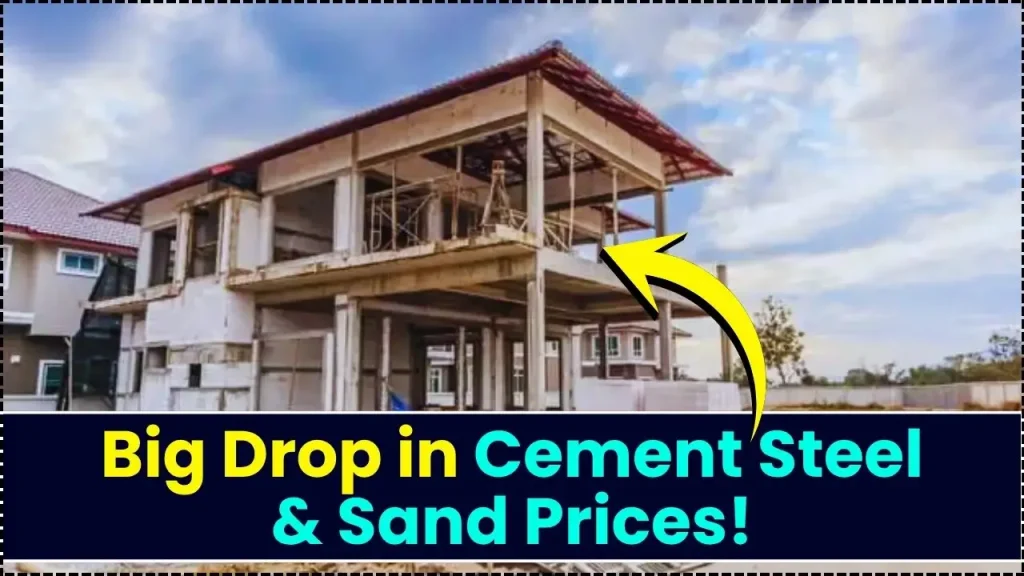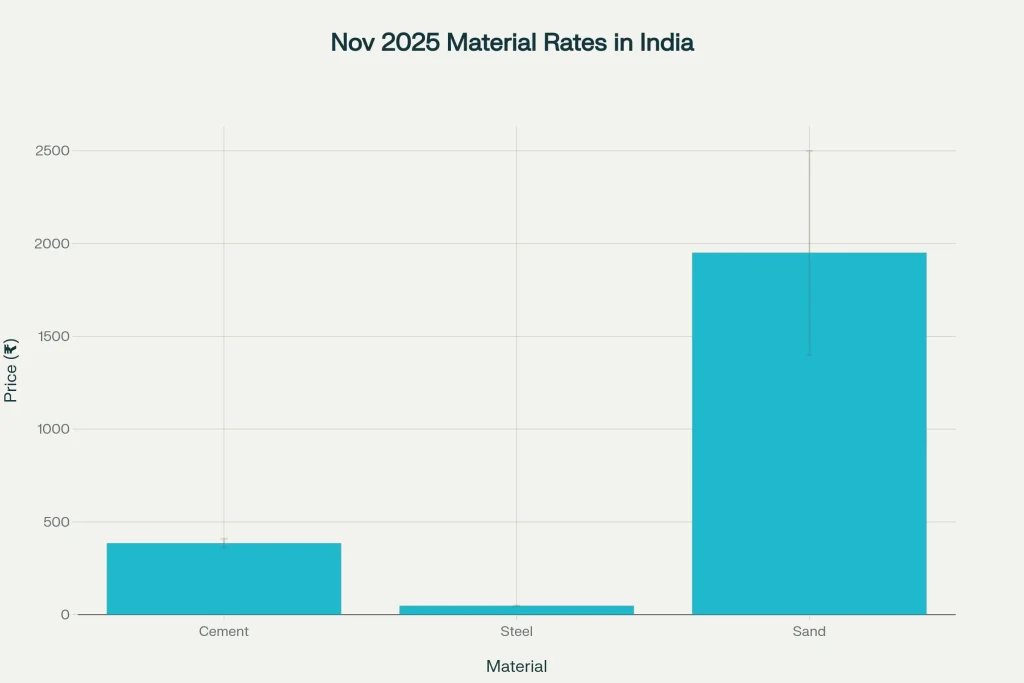If you’ve been holding off your home project waiting for a better window, this is it. Across several Indian cities, cement, TMT steel, and construction sand have softened from late October into early November, giving self-builders and small contractors a genuine chance to shave costs without compromising on quality. The biggest wins right now come from negotiating tax-inclusive quotes, booking in weekly cycles, and aligning deliveries with pour and masonry schedules to avoid idle inventory and wastage.

Cement, steel, and sand price today is the lens you should use to finalize purchase decisions this month. With mainstream OPC/PPC bags trending in a competitive range, TMT steel holding in the mid-to-high ₹40s per kg depending on diameter, and sand normalizing with bulk order benefits, the next 2–3 weeks are well-suited for locking quantities phase-wise. Keep quotes inclusive of GST, verify grade/diameter and brand, and match order sizes to foundations, slabs, and plastering windows for maximum savings.
Big Drop in Cement Steel & Sand Prices
| Material | Today’s Indicative Range | Practical Notes |
|---|---|---|
| Cement (50 kg) | ₹360–₹410 for popular OPC/PPC brands; specialty and white cement higher | Prices vary by city, brand, and logistics; PPC often undercuts OPC for non-structural work. |
| TMT Steel | ₹46.5–₹49.5 per kg for common diameters | 12–32 mm near the lower band; 8–10 mm typically commands a small premium. |
| Sand (Delivered) | ₹1,800–₹2,500 per ton retail; ₹1,400–₹1,800 bulk | M-sand vs river sand pricing depends on grade, source, and trucking distance. |
Use this month’s softer trend to your advantage. Lock cement in the competitive band that fits your brand preference and structural design, negotiate TMT near the city’s mid-to-high ₹40s per kg benchmarks by diameter, and book sand in bulk with clearly defined grades. Keep everything GST-inclusive and aligned to site schedules, and you’ll convert today’s market into a lean, well-controlled materials bill just in time to break ground with confidence.
Why Prices Are Softer Right Now
- Seasonal supply and demand: Post-monsoon logistics have steadied in many corridors, helping bring delivered rates to more competitive levels.
- Dealer-level competition: City boards and dealer sheets reflect an easing trend, especially on PPC cement and prime diameters of TMT that move in volume.
- Bulk leverage on sand: Aggregated orders (50+ tons) for foundation and masonry phases unlock better slabs than piecemeal runs.
Cement Market Snapshot: OPC vs PPC
- Working band: Most mainstream brands for 50 kg OPC/PPC bags cluster around a value zone that rewards volume commitments, with PPC typically priced lower and perfectly suited for masonry and plaster where spec allows.
- Brand mix strategy: Use PPC for non-structural applications and reserve OPC for structural pours as per your engineer’s notes this single choice often trims the cement bill without trade-offs on performance.
- Buying checklist: Ask for week-long, tax-inclusive quotes, clarify unloading charges, and confirm warehouse age (freshness of cement) to avoid strength loss risks.
TMT Steel Rates and What to Check
- Price cues: City references for common diameters (12–32 mm) remain in the mid-to-high ₹40s per kg band; thinner 8–10 mm bars usually sit slightly higher due to demand and rolling specifics.
- Quality verification: Check Fe grade (preferably Fe500D or Fe550D as per design), demand mill test certificates and heat numbers, and always verify diameter with calipers on delivery.
- True landed cost: If you’re outsourcing cutting and bending, add those charges into your per-kg math; factoring them up front avoids surprises at slab time.
Sand: Grades, Sourcing, And Savings
- Grade clarity: For concrete, use well-graded concrete M-sand or approved river sand; for plastering, opt for plaster-grade M-sand for smoother finishes and consistency.
- Bulk benefits: The single biggest swing factor is order size bundling foundation, plinth, brickwork, and early plastering needs can push you into lower rate tiers.
- Moisture and measurement: Wet sand is heavier; ensure moisture checks and fair weighing, and avoid peak-hour unloading that can invite extra site charges.
GST And Billing Essentials
- Standard slabs: Cement and most iron/steel items fall under 18% GST; confirm that quotes are inclusive to make apples-to-apples comparisons.
- Documentation discipline: Ensure correct HSN, brand/grade, bag count or weight, and diameter listing on invoices; this supports warranty, compliance, and smooth audits later.
How To Capture The Lowest Market Rates This Month
- Anchor on city references: Use widely published city boards and brand matrices to set a negotiation baseline; PPC stacks often carry more wiggle room than OPC.
- Time your orders: Cement just before pours; TMT aligned to cutting/bending cycles; sand in bulk tied to foundation and early masonry for best price-per-ton.
- Lock short windows: Seek validity of at least 5–7 days on quotes; rates can move with freight and dispatch constraints, so a valid window protects your budget.
- Verify inclusions: Freight, GST, unloading, and handling get everything in writing to avoid “last mile” add-ons.
Sample Budget Mapping for A 1,000–1,200 Sq Ft Home
- Cement: 320–380 bags depending on design and block choice; at ₹380 per bag, that’s roughly ₹121,600–₹144,400.
- Steel: 5–7 tons typical for G+0/G+1 footprints; at ₹46.5 per kg, you’re looking at ₹232,500–₹325,500 before any cutting/bending premium.
- Sand: 60–100 tons spanning foundation to plaster; at ₹1,600 per ton bulk, budget ₹96,000–₹160,000 with grade splits.

City-Level Pointers You Can Use
- Metro/tier-1: Expect to sit closer to the upper side of bands due to higher freight and yard costs; still, bulk and scheduled deliveries unlock advantages.
- Tier-2/3 and suburbs: More headroom on PPC and sand if quarries and mills are within shorter hauls; negotiate harder on inclusive pricing.
- Hill/remote belts: Freight dominates; plan bigger drops less often, protect materials from weather, and ensure access roads for heavy vehicles.
Practical Buying Checklist (Keep This Handy)
- Cement: Grade per structural notes; week-long inclusive quote; bag freshness; unloading terms; store off the floor with pallets and covers.
- Steel: Fe grade; diameter verification; MTC/heat numbers; weighment slips; include cutting/bending or plan reliable yard services.
- Sand: Grade and source; moisture check; fair weighing; schedule bulk drops; plan unloading crew to avoid demurrage.
- Paperwork: GST-inclusive invoices; correct HSN; full product descriptors; delivery challans saved and photographed on receipt.
Cement, Steel, Sand Price Today Putting It All Together
Cement, steel, and sand price today is favorable for homeowners who plan purchases smartly. Target mainstream cement around the competitive mid-band, anchor TMT bars in the mid-to-high ₹40s per kg depending on diameter, and extract sand savings by booking in bulk with clear grade specs. Prioritize tax-inclusive quotes, delivery alignment with site phases, and tight quality checks at receipt. That’s how you turn softer market rates into real, on-ground savings—without compromising structural safety or finish quality.
FAQs on Big Drop in Cement Steel & Sand Prices
What’s The Best Time to Buy Cement for a Home Build?
When dealer boards show month-on-month easing and before seasonal demand spikes. The early-November window is favorable lock week-long, tax-inclusive quotes and align deliveries to pour dates.
How Do I Verify TMT Steel Quality at Delivery?
Check Fe grade (500D/550D as specified), verify heat numbers and mill test certificates, measure diameter with calipers, and match weighment slips to invoices.
Which Sand Is Better for Plastering River Sand Or M-Sand?
Either works if grading and cleanliness are right. Plaster M-sand offers consistency and availability; river sand may cost more based on local restrictions and freight.
How Much Should I Budget for Sand in A 1,000 Sq Ft Build?
Expect roughly 60–100 tons across foundation to plaster depending on design and walling choices; booking in bulk tranches typically unlocks the best per-ton rates.
















